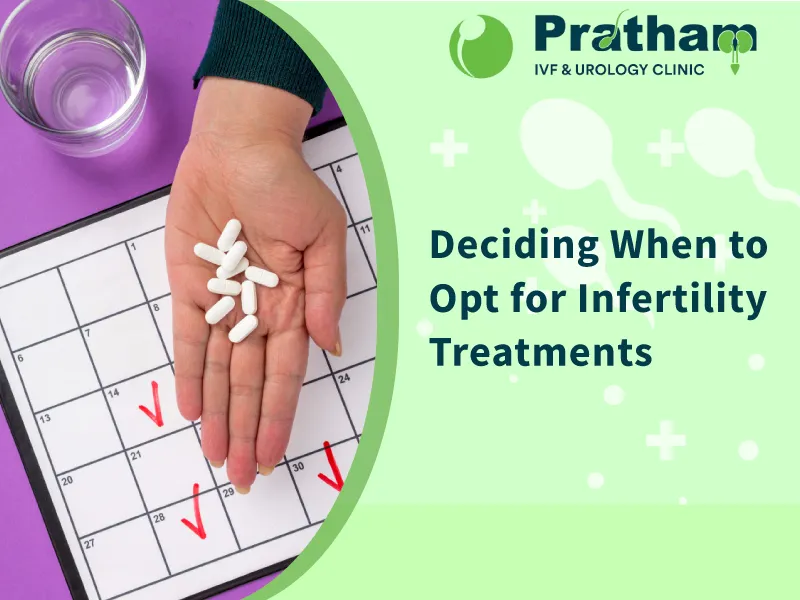
Deciding When to Opt for Infertility Treatments
The path to becoming a parent is a deeply emotional and personal one. Deciding whether to pursue infertility treatments is crucial and frequently difficult for many couples who are experiencing infertility. Financial considerations, emotional health, and the effectiveness of various therapies can all be greatly impacted by the time. With the aid of this thorough guide, couples will be better equipped to make educated decisions about their road to parenting as they examine the variables to take into account while choosing infertility treatments.
What is infertility?
The failure to conceive after a year of consistent, unprotected sexual activity for couples under 35 is the standard definition of infertility. The age-related drop in fertility means that for couples over 35, the duration is frequently shortened to six months. It is imperative to acknowledge that infertility is a multifaceted problem with numerous underlying causes. It has more to do with timing than that.
Factors to Consider When Deciding on Infertility Treatments
- Age : Fertility is greatly influenced by age. Aging causes a decrease in fertility, particularly in women. If they are over 35, they should see a fertility doctor after six months of trying, while those under 35 should wait a year before considering treatment.
- Known Medical Issues : It would be wise to consult a doctor early in your trip if you or your spouse have known medical issues that could influence fertility, such as Polycystic Ovary Syndrome (PCOS), Endometriosis, or a history of STDs.
- Lifestyle Factors : Evaluate factors that could impact fertility. Smoking, excessive alcohol consumption, obesity, and exposure to environmental toxins can all affect fertility. Addressing these factors may be necessary before or during infertility treatments.
- Regular Intercourse : Ensure you have regular and unprotected intercourse during the female partner's fertile window. Sometimes, the timing of intercourse is the primary obstacle to conception.
- Emotional and Psychological Well-being : The emotional toll of infertility can be significant. Consider how trying to conceive without success affects your emotional and psychological well-being. If the emotional burden becomes overwhelming, it might be time to explore treatment options.
- Medical History : Seeking medical help as soon as possible may be advised if you or your spouse have a history of recurrent miscarriages or known male reproductive concerns.
- Personal Preferences : Some couples might not want to wait the customary six months or a year to seek treatment because they are eager to begin a family.
When to Seek Professional Help
When all of these things are taken into account, it is best to see a professional if you are not getting pregnant in the suggested amount of time. Here are some actions to think about:
- Consult an Infertility Specialist : Make an appointment with an obstetrician or reproductive health specialist. In order to find any underlying problems, they might conduct preliminary evaluations and recommend testing.
- Diagnostic Testing : Diagnostic tests may include ovulation evaluation, semen analysis, hormone testing, and imaging techniques such as hysterosalpingography or ultrasound to evaluate the reproductive organs, depending on your specific situation.
- Partner Involvement : The evaluation procedure should involve both parties. Male infertility factors are equally significant, and a successful conclusion depends on resolving any difficulties.
- Consult a Fertility Specialist : If initial tests indicate potential fertility issues, it may be time for some treatment. They can provide a more in-depth assessment and discuss appropriate treatment options.
Infertility Treatment Options
Once you've decided to pursue infertility treatments, your fertility specialist will discuss various options tailored to your situation. These options may include:
- Ovulation Induction : Letrozole or clomiphene citrate are two medications that can induce ovulation in women who do not normally ovulate.
- Intrauterine Insemination (IUI) : During this process, possible cervix-related barriers are avoided by injecting well prepared sperm straight into the uterus. When there are minor problems related to male factor or infertility that cannot be explained, IUI may be used.
- In-Vitro Fertilization (IVF) : IVF is a more sophisticated and successful form of treatment. The process entails taking the woman's eggs out of her ovaries, fertilizing them in a lab with sperm, and then putting the resultant embryos back into the uterus. IVF is effective for a variety of infertility problems, such as severe male factor infertility, unexplained infertility, and tubal obstructions.
- Intracytoplasmic Sperm Injection (ICSI) ICSI and IVF are frequently combined. To fertilize an egg, a single sperm must be injected directly into it. For situations of severe male infertility, ICSI is helpful.
- Donor Eggs or Sperm : Using donor sperm or eggs might be a good alternative for couples who are facing particular fertility difficulties.
- Surrogacy : Surrogacy may be an option if the intended mother cannot safely carry the pregnancy through.
- Adoption : For couples who are unable to conceive naturally or with reproductive treatments, adoption offers an alternative route to motherhood.
Why Choose Pratham IVF?
Pratham IVF happens to be a trusted, reputed, and reliable IVF Center in Ahmedabad, providing the best treatment at a competitive price. Here are a few reasons why Pratham IVF should be your first choice when it comes to IVF treatment.
- Adequately trained and vastly experienced team of experts
- More than two decades of experience
- State-of-the-art laboratories
- Use of modern tools and technologies
- High success rate
- Premium IVF Center in Ahmedabad
- Highly skilled and professional staff
Thus, at any point in time you feel infertility is ruining all your happiness in life, do not waste even a moment and book an appointment at Pratham IVF to enjoy parenthood.
 Ahmedabad Top Rated IVF Center
Ahmedabad Top Rated IVF Center




